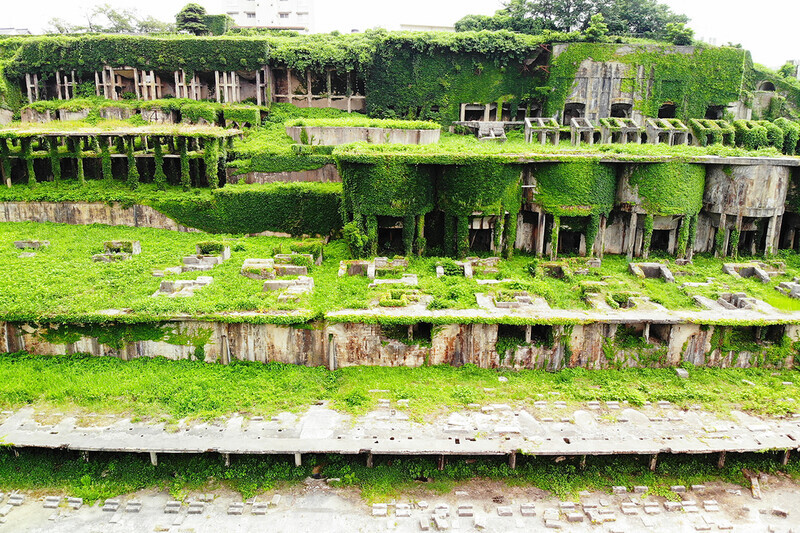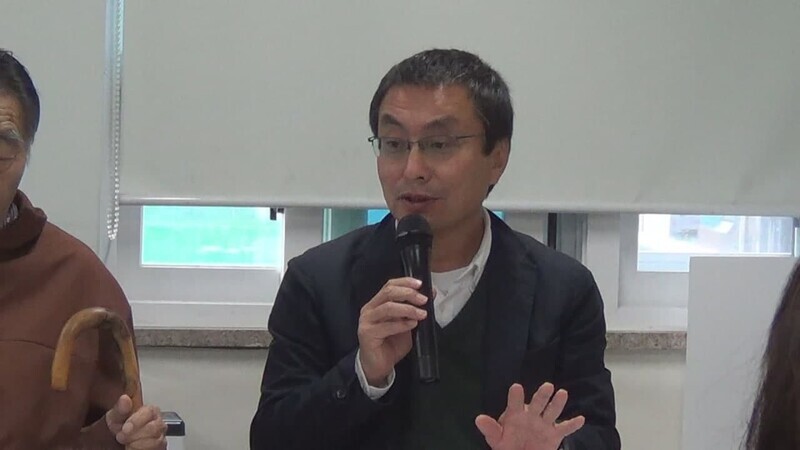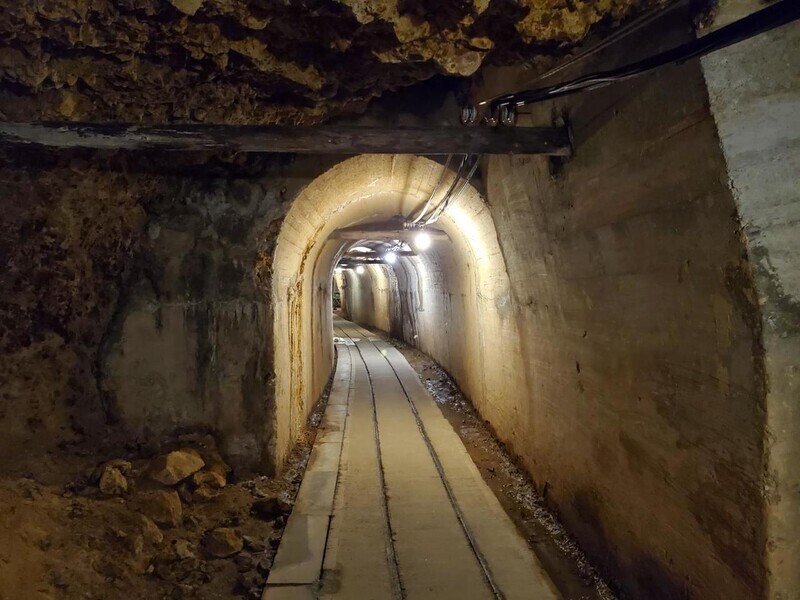hankyoreh
Links to other country sites 다른 나라 사이트 링크
[Interview] Japan must “stop denying history” with Sado mines World Heritage bid

“If the Japanese government goes ahead with registering the Sado gold mines [as a UNESCO world heritage site] while denying their history of forced labor, it will trample on the dignity of those who have striven to expand [true] historical value, those who have fought to reveal their historical truth, and the victims of forced labor [during the war].”
That was part of a statement released on Jan. 25 by the Network for Learning the Truth about Compulsory Mobilization, a Japanese civic group, following reports that the Japanese government intends to register the Sado mine site with UNESCO.
After the Japanese government proceeded to apply for UNESCO recognition of the site on Feb. 1, the network and several other like-minded civic groups in Japan vocally criticized the move. The Japanese government describes the mines as a historical site where ore was dug up through traditional manual industries during the Edo period. But they were also a tragic location where more than 1,500 Korean labor conscripts were put to work during World War II.
That painful history would be swept under the rug by the Japanese government’s plan to only highlight the site’s history from the Sengoku, or “Warring States,” period to the Edo period.
The Japanese government’s attitude is akin to the one it adopted when it registered Hashima Island — also called Gunkanjima or “Battleship Island” — as a World Heritage site in 2015.
At the time, the Japanese acknowledged that Koreans had been conscripted against their will and forced to work on the island and promised to set up an information center to raise awareness of that history if Hashima were granted UNESCO status. But that turned out to be an empty promise.
Even as Tokyo ignores the second request UNESCO made last year to include information about forced labor, it’s seeking World Heritage status for the Sado mine complex, yet another place where Koreans were forced to labor during the war.
“South Korea’s claim that the Sado mine complex was a site of forced labor is factual,” Network for Learning the Truth about Compulsory Mobilization Director-General Mitsunobu Nakata told the Hankyoreh.
“The Japanese government needs to stop denying history and acknowledge the truth of forced labor,” he stressed.
Nakata also warned, “If UNESCO registers the Sado mines on the World Heritage list without an agreement between South Korea and Japan as the parties involved, the World Heritage list itself will lose its raison d’etre.”
The interview was conducted on Feb. 10 over email.

Hankyoreh (Hani): What sort of place is the Sado mine complex?
Mitsunobu Nakata: After the discovery of a vein of gold there in the early 1600s, the Sado site was at one point Japan’s biggest gold mine. The Japanese government is arguing its World Heritage value on the basis of things like the mining of it having been a traditional craft during the Edo era.
But there were also factors like harsh labor conditions, workplace accidents, and resistance on the part of the workers. In particular, it’s a site associated with a painful episode of history during World War II, when the Japanese government mobilized colonial subjects in Korea for forced labor under its mass mobilization system.
Hani: Efforts to register the Sado mines on the list are gaining momentum, despite Japan not honoring its previous pledge to inform people about the historical facts associated with Hashima.
Nakata: During the 44th session of UNESCO’s World Heritage Committee last year, they approved a resolution expressing “strong regrets” to Japan over the Hashima issue and demanding that the pledge be honored.
To begin with, the Japanese government needs to submit a report by December on “improvements to the implementation situation” [for exhibitions at its Industrial Heritage Information Center], including historical records on forced labor mobilization on Hashima. We’re at a crucial juncture in terms of whether the Japanese government is able to fully deal with the historical fact of forced labor mobilization, which had hitherto been hidden.
Given how it’s dug in its heels in its pursuit of the Sado mine complex’s World Heritage registration — insisting that the history of forced mobilization of Koreans there is just a “unilateral claim” by Korea — I think the prospects for its registration look dim.
Hani: It’s been said that the Japanese government had originally been reluctant to pursue the listing this year, but they were unable to withstand with criticisms of “wishy-washy” diplomacy by conservative hardliners like former Prime Minister Shinzo Abe and his policy chief, Sanae Takaichi.
Nakata: In 1995, the Japanese government issued what’s become known as the “Murayama Statement.” It was an apology for Japan having “advanced along the road to war [. . .] and, through its colonial rule and aggression, caused tremendous damage and suffering to the people of many countries, particularly to those of Asian nations.”
But Abe and Takaichi are two of the most prominent politicians who oppose the attitude of reflection on Japan’s history of invasions that was expressed with the Murayama Statement, and in terms of denying responsibility for colonization and adopting a revisionist approach to matters like the “comfort women.”
Meanwhile, [current] Prime Minister Fumio Kishida reversed his cautious stance on the Sado mines’ World Heritage registration out of concerns that he would end up labeled as “passive” by Abe and other conservatives ahead of this summer’s House of Councillors election.
Hani: What do you see as the reason for the hardliners being so dead set on registering the Sado mines?
Nakata: Part of it may be the actual goal of simply getting the Sado mines registered as World Heritage. But I think there’s also a political objective, where hardliners like Abe are trying to use this issue to expand the conservative base.
The idea is to broaden their support by creating Korea as this outside enemy and then fanning feelings of nationalism and antagonism toward their neighbor. It also appears they have the aim of rallying conservatives by exploiting anti-Korean sentiments and other issues to encourage feelings of nationalism.

Hani: Why do you think this issue has been raising concerns even within Japan?
Nakata: First off, we need to understand the purpose of the UNESCO World Heritage list. The international community created the United Nations to deter war after the horrific experience of two world wars. They followed that up by issuing the Universal Declaration of Human Rights, which stressed how acknowledging human dignity and equal rights would lead to a just and peaceful world, and they established UNESCO to create a fortress of peace in people’s hearts through education, culture, and science.
They further adopted content about the need to determine the value of world heritage based on a broader set of social, cultural, historical, and natural circumstances and backgrounds. As a reflection of that, World Heritage needs to be a foundation for promoting peace for humankind.
You can’t register something as World Heritage with an attitude of disregarding negative aspects of history, the way they’re doing now with the Sado mines.
Hani: In a recent editorial on this issue, the Mainichi Shimbun newspaper warned that it would “using culture for politics, with the intention of taking a confrontational attitude with our close neighbors, will in the end harm Japan's national interests, not help them.”
Nakata: For example, when it came to the issue of forced labor conscription between Korea and Japan, many of the Japanese media would simply parrot the Japanese government’s position. This time, however, we’re seeing articles expressing the stance that says, “in the interest of a proper understanding of history, we can’t deny the issue of colonial labor mobilization.”
At the same time, you still see outlets like the Yomiuri Shimbun or Sankei Shimbun newspapers or the NHK network, which focus their reporting on the Japanese government’s position and activities. NHK in particular has been framing this issue as a “history war” between Korea and Japan — but it’s wrong to look at historical issues as being about “winning” and “losing.”
The debate needs to be focused on seeking the historical truth. We need to look at who benefits from fanning this conflict.
Hani: Some have suggested that without a resolution to the historical denialism issue surrounding Hashima, the chances of an additional registration is realistically low.
Nakata: Currently, UNESCO requires dialogue among the parties involved when World Heritage sites are being registered. As far as Japan is concerned, they need to pursue dialogue rather than getting into a “diplomatic war” with Korea.
Conversely, if UNESCO were to bow to pressure from the Japanese government and approve the Sado mines’ registration without an agreement between Korea and Japan, there are concerns that this would undermine the very basis for the World Heritage list’s existence in the first place.
Losing ground in the victory over colonialismJapan’s rush to register the Sado mines on the World Heritage list has created yet another source of strife in relations with South Korea.
In a Feb. 3 telephone conversation with his Japanese counterpart Yoshimasa Hayashi, South Korean Minister of Foreign Affairs Chung Eui-yong reportedly expressed “deep disappointment and protest” over the Japanese government’s “decision to pursue World Heritage registration of the Sado mine complex, while ignoring the painful history of forced Korean labor there.” The South Korean Ministry of Foreign Affairs (MOFA) also set up a task force to block the Sado mine complex from being registered with UNESCO.
The situation has created additional tension between Seoul and Tokyo. Raising the issue in a written interview with Yonhap and seven global news agencies on Feb. 10, South Korean President Moon Jae-in said it was “unnerving at a time when we should be resolving issues linked to our history and seeking to develop future-oriented relations.”
The question of whether the Sado mines will be added to the World Heritage list is to be decided sometime around summer 2023, based on a recommendation to be made around May of that year by the International Council on Monuments and Sites, or ICOMOS, an advisory institution for UNESCO.
Hani: Japan’s single-minded attitude on historical issues is causing additional conflict.
Nakata: In 2001, the UN held the World Conference Against Racism, Racial Discrimination, Xenophobia and Related Intolerance in the South African city of Durban. There, it adopted the so-called Durban Declaration, which stressed that colonialism should be condemned and prevented from ever happening again.
The international community has been proceeding ever since on the path toward overcoming colonialism. When the South Korean Supreme Court handed down its ruling on forced labor conscription three years ago, or when it ruled to not recognize the Japanese government’s sovereign immunity and to order restitution of the “comfort women” victims’ human rights, I see that as having been part of that trend.
It’s very concerning to see how certain conservatives in Japan have been proceeding in exactly the opposite direction.
Hani: It doesn’t seem like there’s any potential to find common ground any time soon.
Nakata: In Japan, there has been a great deal of research on forced labor mobilization issues as part of the project of postwar compensation and taking responsibility for colonial rule. But if you look at the rightward shift in Japanese society recently, it would be difficult to argue that a critical stance on denialism regarding forced labor mobilization represents a universal attitude in today’s Japanese civil society.
Meanwhile, Japan’s major media are ignoring the question of whether the Sado mines hold enough historical and cultural value to warrant being added to the World Heritage List. Instead, they’re reporting on the matter as a political battle between South Korea and Japan.
It also seems to be the case in South Korea that some of the reporting makes it out as though the only focus of the issue is on whether the Japanese government will acknowledge the facts of forced labor mobilization. This is a time that calls for objective, cool-headed discussion.
By Hong Seock-jae, staff reporter
Please direct questions or comments to [english@hani.co.kr]

Editorial・opinion
![[Editorial] Penalties for airing allegations against Korea’s first lady endanger free press [Editorial] Penalties for airing allegations against Korea’s first lady endanger free press](https://flexible.img.hani.co.kr/flexible/normal/500/300/imgdb/original/2024/0502/1817146398095106.jpg) [Editorial] Penalties for airing allegations against Korea’s first lady endanger free press
[Editorial] Penalties for airing allegations against Korea’s first lady endanger free press![[Editorial] Yoon must halt procurement of SM-3 interceptor missiles [Editorial] Yoon must halt procurement of SM-3 interceptor missiles](https://flexible.img.hani.co.kr/flexible/normal/500/300/imgdb/child/2024/0501/17145495551605_1717145495195344.jpg) [Editorial] Yoon must halt procurement of SM-3 interceptor missiles
[Editorial] Yoon must halt procurement of SM-3 interceptor missiles- [Guest essay] Maybe Korea’s rapid population decline is an opportunity, not a crisis
- [Column] Can Yoon steer diplomacy with Russia, China back on track?
- [Column] Season 2 of special prosecutor probe may be coming to Korea soon
- [Column] Park Geun-hye déjà vu in Yoon Suk-yeol
- [Editorial] New weight of N. Korea’s nuclear threats makes dialogue all the more urgent
- [Guest essay] The real reason Korea’s new right wants to dub Rhee a founding father
- [Column] ‘Choson’: Is it time we start referring to N. Korea in its own terms?
- [Editorial] Japan’s rewriting of history with Korea has gone too far
Most viewed articles
- 160% of young Koreans see no need to have kids after marriage
- 2[Editorial] Penalties for airing allegations against Korea’s first lady endanger free press
- 3Presidential office warns of veto in response to opposition passing special counsel probe act
- 4Hybe-Ador dispute shines light on pervasive issues behind K-pop’s tidy facade
- 5Months and months of overdue wages are pushing migrant workers in Korea into debt
- 6Japan says it’s not pressuring Naver to sell Line, but Korean insiders say otherwise
- 7S. Korea “monitoring developments” after report of secret Chinese police station in Seoul
- 8OECD upgrades Korea’s growth forecast from 2.2% to 2.6%
- 9[Reporter’s notebook] In Min’s world, she’s the artist — and NewJeans is her art
- 10[Guest essay] Maybe Korea’s rapid population decline is an opportunity, not a crisis